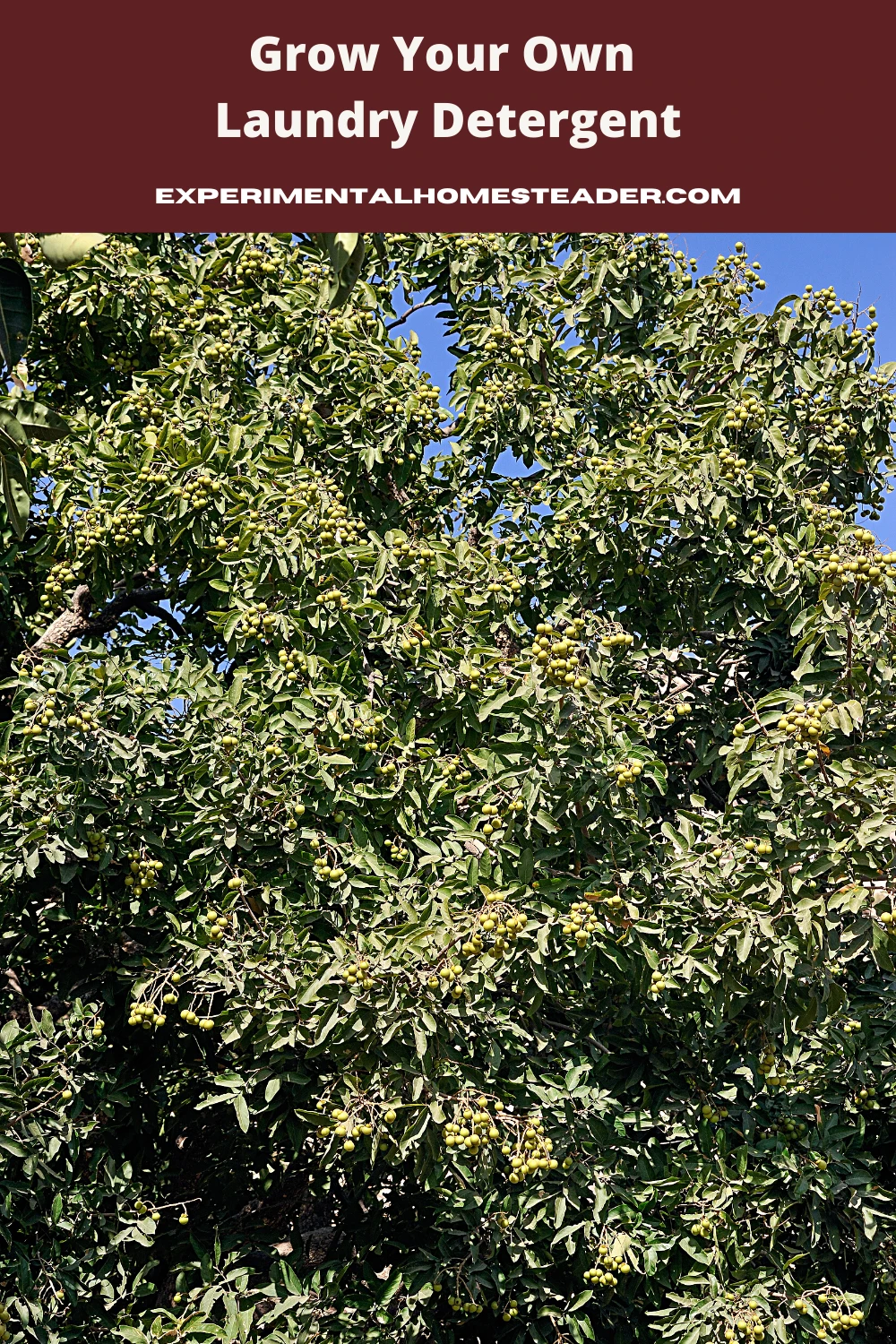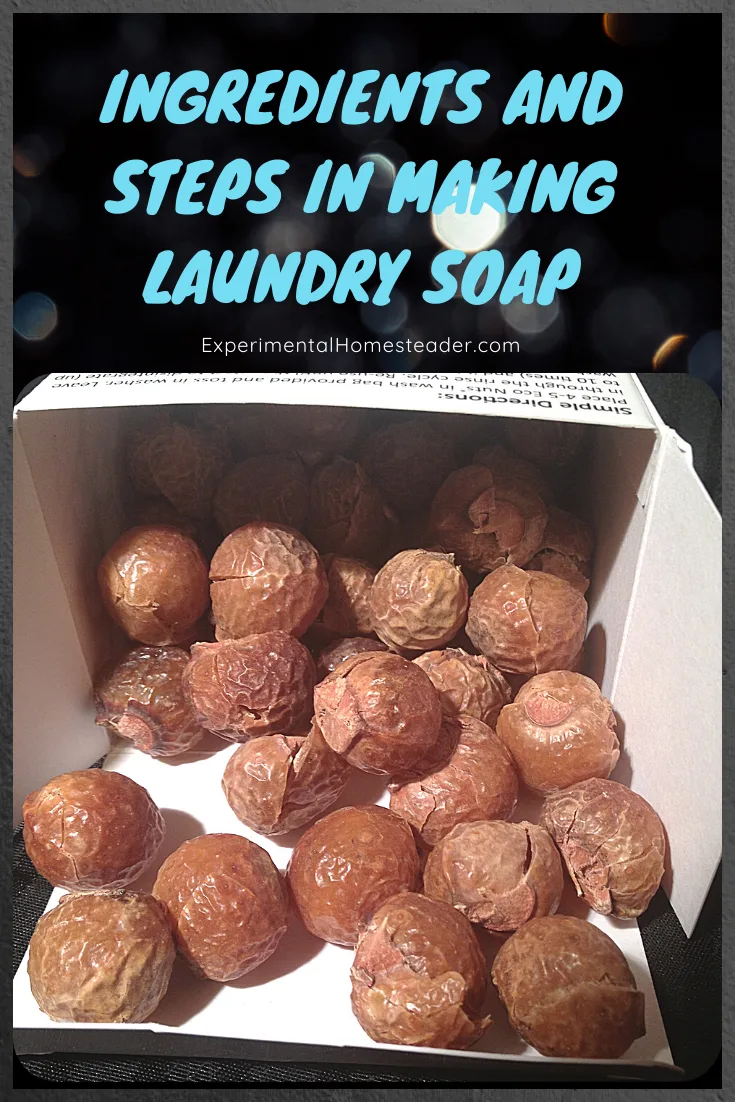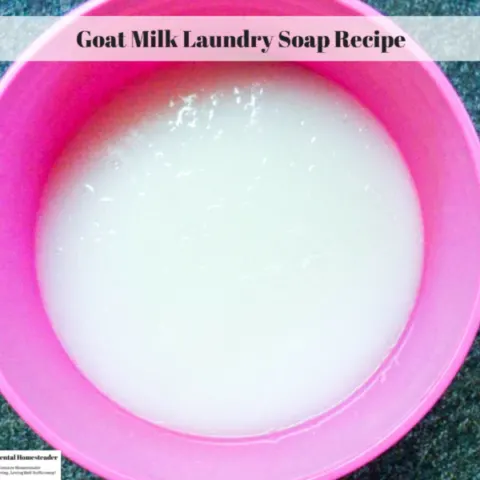Disclaimer: I received a box of the Eco Nuts(R) for free in exchange for my honest review. All opinions are my own.
Yes, you really can grow your own laundry detergent, right in your backyard!
Imagine walking outside, harvesting the fruit from your own soapberry tree, and turning it into an all-natural cleaner that keeps your clothes fresh without synthetic chemicals.
For homesteaders, learning how to grow your own laundry detergent is a practical and rewarding step toward self-sufficiency.
The best part is, you don’t have to wait years to start reaping the benefits.
While your soapberry tree matures, you can still enjoy this eco-friendly alternative by purchasing soap nuts, also sold as Eco Nuts®.
Eco Nuts® are simply the dried berry shells from the soapberry tree (Sapindus spp.).
When soaked in water, they release saponin, a natural cleaning agent that’s gentle on skin yet tough on dirt.
Whether you grow your own laundry detergent or buy it ready-to-use, this sustainable, biodegradable option is a perfect fit for any homestead.
What Are Soap Nuts?
Soap nuts are the fruit of the Sapindus tree, a versatile and hardy plant found in many parts of the world.
Also known as soapberries or Indian soap berries, these small, leathery-skinned fruits might not look like much at first glance, but they hold a powerful secret.
Inside their shells is saponin, a natural soap-like compound that foams gently in water and cuts through dirt, grease, and odors.
When people talk about “using plants to clean,” soap nuts are one of the best examples.
They’ve been used for thousands of years in India and Nepal, where families have traditionally harvested the berries, removed the seeds, and dried the shells for later use.
Once dried, the shells are ready to use directly in laundry or steeped in hot water to create a multipurpose cleaning liquid.
Soap nuts are perfect for anyone looking to grow their own laundry detergent because they’re renewable, biodegradable, and chemical-free.
They don’t require heavy fertilization or pesticides to grow, making them an ideal low-maintenance crop for eco-conscious homesteaders.
Whether you grow them yourself or purchase them from a trusted supplier like Eco Nuts®, you can rest easy knowing your laundry is being cleaned by nature’s own detergent, one that’s safe for your skin, your clothes, and the planet.
Where Do Soap Nuts Grow?
Soap nuts come from Sapindus trees, which grow in warm, sunny climates around the world.
These trees are incredibly adaptable, with different species suited to various USDA Hardiness Zones.
That means, if you want to grow your own laundry detergent, you can likely find a soapberry variety that will thrive right in your backyard.
For example, Sapindus mukorossi - the variety used to make Eco Nuts® - is native to the Himalayas and grows primarily in parts of Asia.
It’s a larger species, producing big, high-saponin berries perfect for laundry.
This variety prefers subtropical to tropical conditions, so it’s best suited for USDA Zones 10 and above unless you have a greenhouse.
But don’t worry, if you live in a cooler climate, there are other Sapindus species that can grow in Zones 6–9.
These trees may produce slightly smaller berries, but they still contain the same natural cleaning power.
When planning your planting, it’s important to choose a variety suited to your local conditions.
Consider your average winter lows, humidity levels, and available space, since some Sapindus trees can grow 30 to 50 feet tall.
Even if you can’t grow one outdoors year-round, you can keep smaller varieties in large pots and move them into a protected area during the winter.
That way, you can still work toward your goal to grow your own laundry detergent - even in less-than-tropical climates.
How To Grow Soap Nuts
Growing soapberry trees is surprisingly straightforward, especially for homesteaders who value hardy, low-maintenance plants.
These trees are tough - they tolerate poor soil, drought, heat, wind, and even salt spray.
That means whether you live on a windy ridge, near the coast, or in an area with unpredictable rainfall, you can still successfully grow your own laundry detergent.
Start by choosing a sunny location with well-draining soil.
Soapberry trees don’t like to sit in soggy ground, so avoid low-lying areas where water collects.
You can grow them from seed, but be aware that the seeds have a hard outer shell and require scarification (lightly nicking or filing the shell) before planting to encourage germination.
Even then, it can take months for seedlings to sprout.
If you want quicker results, consider buying a young tree from a nursery.
A well-established plant will reach fruiting size faster, sometimes within 3 to 5 years instead of 7 to 10 from seed.
During the first few years, prune lightly to shape the tree and encourage strong growth.
Once mature, your soapberry tree will produce clusters of green fruits that ripen to a golden-brown color before harvest.
After picking, simply dry the shells, remove the seeds, and they’re ready to use.
With minimal care, your tree can provide decades of harvests, meaning you’ll never have to buy laundry detergent again.
How To Use Soap Nuts
Using soap nuts for laundry couldn’t be easier.
In fact, it’s one of the simplest ways to start making the switch before your own tree begins producing.
Whether your goal is to buy or grow your own laundry detergent, the method is exactly the same.
To wash clothes, place 4 to 5 whole soap nut shells (no seeds) in a small cotton or muslin bag.
Toss the bag directly into your washing machine drum along with your laundry.
For best results, use warm or hot water, as heat helps release more saponin from the shells.
If you prefer cold washes, pre-soak the bag in hot water for a few minutes first, then pour the soapy water into the machine along with the bag.
Each batch of shells can typically be used for 3 to 4 loads before they lose their effectiveness.
You’ll know they’re spent when they turn mushy and pale in color.
At that point, add them to your compost pile, they’ll break down naturally and return nutrients to the soil.
To soften clothes naturally, skip store-bought fabric softener and add ½ cup of white vinegar to the rinse cycle.
For a light scent, add a few drops of your favorite essential oil to the vinegar.
Not only is this method effective, but it’s also hypoallergenic, biodegradable, and perfect for sensitive skin.
How To Use Soapberries In A Dishwasher
Soap nuts aren’t just for laundry, they’re a versatile, all-purpose cleaner that can replace multiple chemical-based products in your home.
If you’re looking to get the most out of your harvest when you grow your own laundry detergent, using them in your dishwasher is a perfect example of how far these little shells can stretch.
To use whole soapberries in the dishwasher, place three shells in a small mesh or cloth bag, or drop them directly into the silverware rack.
Fill the rinse aid compartment with white vinegar, this helps prevent water spots and adds extra cleaning power.
Then, run your dishwasher as normal.
If you’d like to add a pleasant, natural scent, sprinkle a pinch of orris root powder inside before starting the cycle.
Depending on your sense of smell, you may notice a light floral aroma similar to violets or lilacs.
The saponin in the soap nuts will work to break down grease and food residue while still being gentle enough for delicate glassware.
And because they’re biodegradable, you won’t have to worry about harmful residues ending up in your septic system or the environment.
Once you’ve tried this method, you may find yourself using soap nuts as your go-to cleaner in both the laundry room and the kitchen.
It’s just another reason homesteaders love these little powerhouse berries, when you grow your own laundry detergent, you’re actually growing a whole household cleaning supply.
Soap Nuts F.A.Q.
What can you use soap nuts for?
Soap nuts aren’t limited to laundry. You can use them for dish soap, hand soap, shampoo, body wash, pet shampoo, dishwasher detergent, all-purpose cleaning spray, shaving cream, and even as a natural pesticide for plants.
Are soap nuts good for hair?
Yes! Soap nuts can help promote hair growth, prevent lice, and add thickness and shine. Many homesteaders use them in homemade herbal shampoos.
Are soap nuts good for skin?
Absolutely—they can soothe eczema, brighten skin tone, fight acne, and even out complexion. Because they’re so gentle, they’re safe for baby skin.
Do soap nuts expire?
No. While they can become sticky if they absorb moisture, this doesn’t affect their cleaning power.
How many times can you reuse soap nuts?
Three to four times, after which you can toss them into your compost bin.
Can you use fabric softener with soap nuts?
It’s best to use vinegar with essential oils for scent, but commercial softeners won’t reduce their cleaning effectiveness.
Final Thoughts
Whether you grow your own laundry detergent from a soapberry tree or purchase ready-to-use Eco Nuts®, the benefits are undeniable.
You’re making a sustainable swap that cuts down on packaging waste, eliminates harsh chemicals from your home, and saves money in the long run.
For homesteaders, this is about more than just clean clothes, it’s about building self-sufficiency, one skill at a time.
Once you plant your tree, you’re setting yourself up for decades of harvests.
Every load of laundry you wash with soap nuts is a small victory in your journey toward independence.
If you’re just starting out, try using store-bought soap nuts so you can get comfortable with how they work.
Meanwhile, look into which Sapindus species will thrive in your climate and start planning where to plant your tree.
By the time your first harvest rolls in, you’ll already be an expert in using this amazing natural cleaner.
And from that point forward, you won’t just be doing laundry, you’ll be doing it with something you grew yourself.
Homemade Laundry Soap Recipes
Goat Milk Laundry Soap Recipe
Make your own laundry detergent using this goat milk laundry soap recipe. It is super easy and only requires three basic ingredients. Scent is optional.









